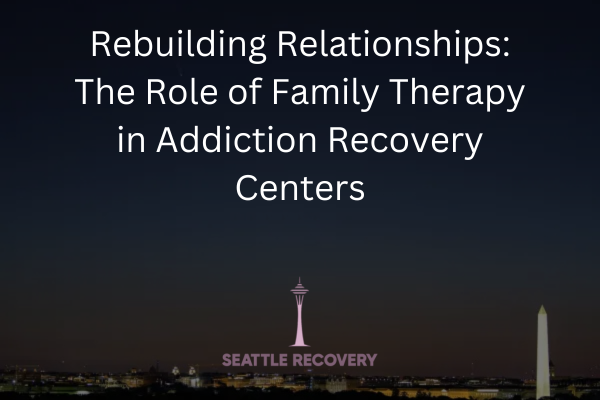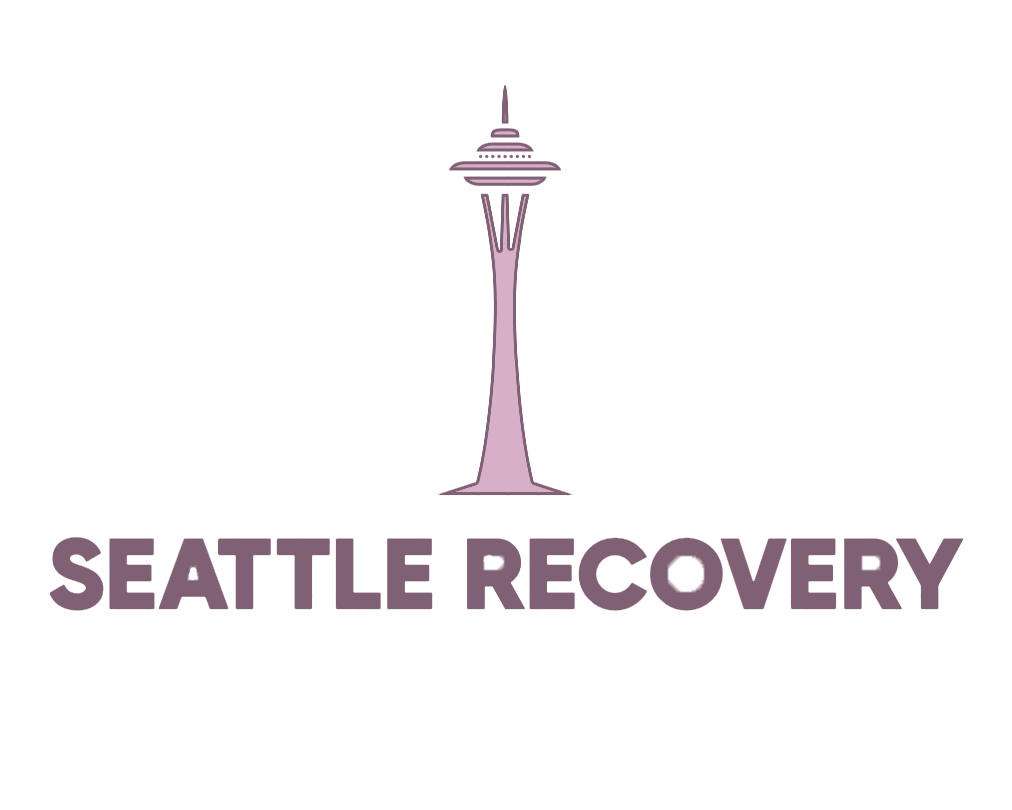Addiction is a deeply isolating and destructive condition, not only for the individual struggling with it but also for their family and loved ones. The impact of substance abuse extends far beyond the addict themselves, often causing rifts, misunderstandings, and emotional damage that can last long after the individual begins their recovery. One of the most powerful and effective tools for healing these wounds is family therapy, which plays a crucial role in helping to rebuild trust, communication, and relationships within families affected by addiction.
At Seattle Recovery, a leading mental health and substance abuse treatment center in Washington, we recognize the importance of family in the addiction recovery centers process. Addiction doesn’t exist in a vacuum, and neither should recovery. Family therapy in addiction recovery centers is a cornerstone of many treatment plans because it addresses the root causes of familial conflict, enhances understanding, and fosters healing among all members. In this blog post, we will explore how family therapy works within addiction recovery centers, why it is so important, and how it can help families rebuild and strengthen their relationships during and after the recovery process.
Understanding the Impact of Addiction on Families
Addiction is not only a personal struggle but a family crisis. When a loved one is battling substance abuse or addiction, it can affect every member of the family in profound and often negative ways. The dynamics of family life change, often leading to feelings of betrayal, hurt, confusion, and resentment. For example:
- Broken Trust: Addiction often involves lying, manipulation, and broken promises. Family members may feel betrayed, leading to a breakdown in trust.
- Emotional Distress: Watching a loved one struggle with addiction can cause significant emotional distress, including anger, anxiety, guilt, and sadness. These emotions can manifest in unhealthy ways, such as codependency or avoidance.
- Communication Breakdown: Families often experience poor communication as they attempt to navigate the chaos of addiction. This can result in misunderstandings, further alienating family members from one another.
- Codependency: In many cases, family members adopt unhealthy coping mechanisms, such as enabling the addict’s behavior or becoming excessively involved in their loved one’s struggles. This often results in a codependent relationship that prevents both parties from healing.
- Negative Effects on Children: Children of individuals with addiction may experience emotional neglect, inconsistent care, or even abuse. These children may develop their own emotional and behavioral issues as they grow older, which can continue into adulthood.
Addiction alters not only the addict’s brain chemistry but also their relationships with others. The damage it causes often feels insurmountable, but healing is possible. Family therapy plays an essential role in this healing process.
What is Family Therapy in Addiction Recovery Centers?
Family Therapy in Addiction Recovery Centers is a form of counseling that involves the family members of an individual in addiction recovery centers. Unlike traditional individual therapy, family therapy focuses on the relationships between the family members and the addict, aiming to address dysfunctions, communication breakdowns, and emotional wounds that may have resulted from the addiction.
In addiction recovery centers, family therapy typically involves a licensed therapist who works with the family unit as a whole, as well as with individual family members. The therapy process can involve a variety of therapeutic techniques, including:
- Cognitive Behavioral Therapy (CBT): A common form of therapy used to identify and change negative thought patterns and behaviors.
- Communication Skills Training: Teaching family members how to communicate more effectively with one another, especially when discussing sensitive topics.
- Conflict Resolution: Helping family members navigate disagreements and find healthy ways to resolve conflicts.
- Family Dynamics Exploration: Exploring how family roles and dynamics have been affected by the addiction and helping to re-establish healthy boundaries and relationships.
- Psychoeducation: Educating family members about the nature of addiction, its effects on the brain, and how they can best support their loved one’s recovery.
The goal of family therapy is to heal the entire family system, rather than focusing solely on the individual struggling with addiction. By restoring harmony within the family, the individual in recovery is more likely to have a successful and sustainable recovery.
The Role of Family Therapy in Addiction Recovery Centers
Family therapy plays a vital role in the recovery process. It serves several important functions, including:
-
Repairing Trust and Communication
Trust is often one of the first casualties of addiction. Family members may feel hurt, abandoned, or manipulated, and restoring trust takes time and effort. Family therapy helps by providing a structured environment in which family members can express their feelings in a safe, non-judgmental space.
Therapists help guide conversations that encourage open communication. This allows each family member to voice their concerns, frustrations, and feelings of hurt without fear of retaliation or judgment. Through active listening and effective communication techniques, family therapy helps rebuild the trust that addiction has often shattered.
-
Breaking the Cycle of Enabling and Codependency
Many family members inadvertently enable addictive behaviors by excusing the addict’s actions, covering up for them, or providing them with the resources that allow them to continue using substances. This pattern is often driven by a desire to protect the loved one or avoid conflict. However, enabling ultimately prevents the individual from facing the consequences of their addiction, hindering their recovery.
Family Therapy in Addiction Recovery Centers helps family members recognize these enabling behaviors and teaches healthier ways to respond to addiction. Codependency, where family members become overly reliant on the addict or vice versa, is also addressed in therapy. By setting boundaries and understanding their roles, family members can learn to support their loved one without enabling destructive behaviors.
-
Addressing the Family’s Own Emotional Needs
While the addict’s behavior is the focus of many treatment programs, it’s important not to overlook the emotional needs of the family members. Often, family members feel neglected or emotionally drained, especially if they have been taking on the role of caregiver or protector for a long period of time.
Family therapy provides a safe space for family members to work through their own emotions, whether that’s anger, fear, sadness, or guilt. It can also help family members understand that they are not responsible for the addict’s behavior, offering them a path to emotional healing and growth.
-
Rebuilding Healthy Family Roles
Addiction often disrupts family dynamics, and family members may adopt unhealthy roles as a result. A spouse may become a caregiver, a parent may become overly permissive, or children may take on adult responsibilities, such as caring for siblings. These roles can lead to dysfunction and imbalance within the family.
Family therapy allows therapists to explore these roles and help family members understand how addiction has affected them. With guidance, they can begin to shift from unhealthy patterns to healthier, more balanced relationships. Rebuilding these roles helps create a foundation of mutual respect and understanding that supports everyone’s recovery.
-
Creating a Supportive Home Environment for Recovery
One of the most significant factors in long-term recovery is the presence of a supportive and stable home environment. When the family works together to address the issues caused by addiction, it creates a much stronger foundation for the individual’s recovery.
Family therapy teaches family members how to be supportive without being overbearing. It helps to set expectations and boundaries while maintaining a compassionate and empathetic approach. By creating a more positive and supportive environment, the individual in recovery is better equipped to maintain their sobriety and work through challenges in their healing journey.
-
Reducing the Risk of Relapse
Research shows that individuals who have strong family support are less likely to relapse after completing treatment. Family therapy addresses not only the issues related to addiction but also helps to build the skills and relationships that make ongoing recovery possible.
In therapy, family members are educated on how to handle situations that may trigger relapse, such as stressful events or interpersonal conflict. By learning how to respond to their loved one in recovery with understanding and support, family members help minimize the chances of relapse.
The Benefits of Family Therapy at Seattle Recovery
At Seattle Recovery, we understand that addiction doesn’t just affect the individual—it affects everyone around them. That’s why we incorporate family therapy into many of our treatment programs. Our licensed therapists work with families to help them heal, communicate more effectively, and support their loved one’s recovery in a healthy, constructive way.
Some of the benefits of family therapy at Seattle Recovery include:
- Personalized Family Support: We tailor family therapy sessions to meet the specific needs of your family, whether you are dealing with communication issues, codependency, or other challenges.
- Experienced Therapists: Our team of therapists has extensive experience in addiction recovery centers and family dynamics. We are here to guide you through difficult conversations and help your family grow stronger.
- Holistic Approach: We believe in treating the whole person—both the individual in recovery and their family. By addressing family issues, we can help foster lasting, positive change in both the individual’s recovery and the family unit.
- Long-Term Support: Recovery is a lifelong process, and so is healing for the family. We provide ongoing support through aftercare services and continue to offer resources and counseling as needed.
Getting Help With Us
Addiction is a family issue, and recovery is not just about the individual—it’s about rebuilding the relationships that addiction has damaged. Family therapy plays a vital role in healing the emotional wounds caused by substance abuse, breaking unhealthy patterns, and helping families support one another in the journey toward recovery.
At Seattle Recovery, we believe that by addressing family dynamics and promoting healthier communication, we can create an environment that supports long-term recovery for everyone involved. If you or a loved one is struggling with addiction, consider the power of family therapy as part of the healing process. We are here to help you rebuild your relationships and find lasting recovery together. Give us a call at (206) 231-0252 to get the help that you or a loved one may need today.








